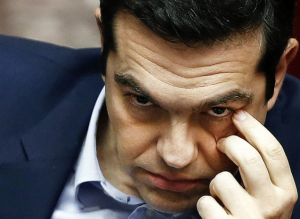 Did he capitulate, or buy time?
Did he capitulate, or buy time?
43.91% of Greeks chose not to vote in yesterday’s elections: so my polling sources who guesstimated 45% were pretty close – even though I thought the figure high.
On very much the ‘losing’ side, Yanis Varoufakis nevertheless talked complete sense when he observed that,
“It is a fact that this [troika] programme cannot work out – it’s a dead end”. So the obvious question remains: what is the point of the newly-reelected Syriza/ANEL Government other than to give a veneer of legality to the crypto-German eurogroupe bullies?
It should be fairly clear from my earlier post tonight that Maarten Vermey has about as much affinity with democratic elections as Stalin did with Trotsky. Just so we are all absolutely clear about this, the Dutchman has been given the power under the agreed MoU to overrule anything Alexis Tsipras might want to do, and to insist that all the myriad codicils of the Greek asset-stripping reform programme are carried through….otherwise, the Greek people face starvation.
However, the thought occurs to me that the one thing Vermey doesn’t have is force as his back-up.
Ever since the Syriza leader caved in to utterly illegal pressure from the Troika two months ago, I have debated at length with a broad spectrum of Greek friends and contacts why on earth he did it. Given a clear mandate to tell eurogrope where to stick their threats, he ignored it and capitulated. Why?
A clear majority of those with whom I correspond and speak believe there is ‘something we haven’t been told’. My instinct is to agree, but I have not the foggiest idea what the something might be. But over the last couple of days I’ve been going through the archives and mulling it over. I am left with two possibilities, and they are not alternatives.
- Tsipras bought time in order to get something very solid set up with Moscow. In a situation involving the general availability (and specific passage routes) of oil to NATO allies, faced with a fait accompli from Putin and Tsipras, I wonder how much power Maarten Vermey would really have. The dragging of Athens into an overtly Russian sphere of influence is one of the more unpleasant nightmares the US State Department has from time to time.
- Potty as it may sound, while Greece got itself into this mess by building defensive weaponry at the behest of NATO in general and Germany in particular, it is now on a per capita basis the best-armed eurozone member. Further, one thing that has kept Golden Dawn firmly in its place has been the position of the military since the crisis began: it has declared itself solidly behind Tsipras and Syriza. It is one thing for the army to take over from a democratically elected Greek government; it is entirely another for colonels to defend Greek sovereignty from the greed of self-appointed foreign interlopers.
This is nothing more than educated conjecture on my part. But I am left pondering the possibility of Tsipras dramatically raising the stakes without warning. Not only would such a move(s) render him a powerfully unifying figure in history; it would put both Brussels-am-Berlin and their American puppeteers in a parlous position.




